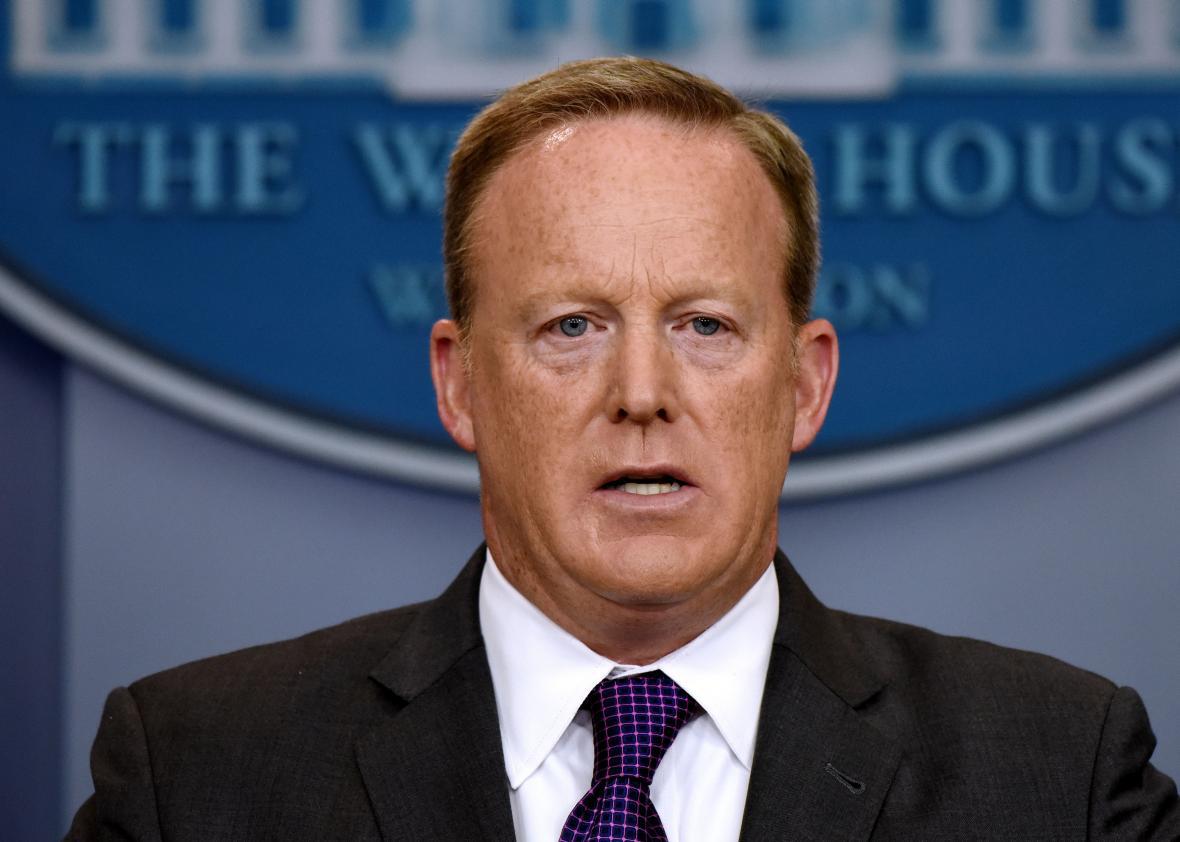Shakespeare’s Marc Antony posited that people are remembered for their evil acts, while the good ones are forgotten. In American public life, it is sometimes the opposite: We see their flaws while they’re in power, their virtues only in retrospect.
That’s probably a loftier allusion than Sean Spicer deserves: The White House press secretary, who resigned on Friday, is regarded more as a comic figure than a tragic one. Yet the task he had set for himself as Donald Trump’s liaison to the media was Herculean. And his performance, inept as it often seemed, was virtuosic in its way.
For much of his time as the administration’s official spokesman, Spicer was popularly perceived as a punchline: a bumbling, stammering, red-cheeked joke who wound himself in rhetorical pretzels trying to justify his boss’s bald-faced lies. That’s a caricature, of course, one that’s indelibly informed by Melissa McCarthy’s devastating parody of him on Saturday Night Live. Still, it’s fair to say that the real Spicer provided ample fodder.
Spicer made his first appearance on the White House briefing room podium in an ill-fitting suit and proceeded to berate the assembled press with an absurd defense of Trump’s unfounded claims about the size of his inauguration crowd. He often responded to tough questions by furiously yet ineffectually cutting reporters off and insisting he had already answered them. He once retreated behind bushes, in the dark, to avoid questions from reporters—then evidently sought and obtained a clarification from the Washington Post that he was merely “among bushes,” not in them. A devout Catholic, he was snubbed at the Vatican. He once seemed to defend Hitler.
For all of that, and more, the Washington Post’s Margaret Sullivan concludes that Spicer will go “down in history as a joke: the president’s spokesman who couldn’t speak for the president.” Her assessment is harsh but not unfair. While Spicer’s predicament might tempt some to sympathize, she rightly points out that he could have walked away at any time.
Yet history isn’t a snap judgment, and Spicer in particular is a character who seems likely to undergo some revisions over the course of its various drafts to come.
His spluttering; his defensiveness; his semantic contortions; his penchant for glancing upward just before embarking on a particularly implausible exercise in obfuscation or spin: These traits gave him the look of a liar. But they’re really the traits of a bad liar, or in Spicer’s case, a person trying desperately to extricate himself from a jam without lying outright. In that fateful first appearance, when he vigorously defended Trump’s crowd-size whopper, he sealed his reputation for toeing the party line even if it meant deviating from the truth.
But when he appeared again days later, he seemed somewhat chastened. Asked by ABC News’ Jonathan Karl if he believed his job was to tell the truth, Spicer said that he did: “Our intention is never to lie to you, Jonathan.” He then launched into a long and earnest explanation of how and why he might sometimes fall short of that goal.
Numerous times over the course of his six months on the job, Spicer struggled to reconcile Trump’s outrageous statements and tweets with the contradictory evidence lobbed at him by a press that smelled blood. Sometimes he failed. Even when he managed to talk his way out, the struggle itself laid bare the fundamental indefensibility of his boss’ position. Nevertheless, he soldiered on, because he really did seem to see it as his mission to defend Trump the best he could without telling flat-out lies.
In that sense, he was bad at his job.
But what we should really fear, and loathe, is the Trump press secretary who is good at his or her job. The sort of person who can stand on the podium before a room full of journalists and lie, straight-faced and convincingly—as Trump does habitually; as Mike Pence did in the vice presidential debate—is a far worse and more dangerous person than the likes of Spicer. Spicer’s refusal to outright fib tethered the administration, however tenuously, to our shared reality. A spokesperson with less compunction about lying might sever that connection completely.
We’ll soon find out whether Spicer’s successor, Sarah Huckabee Sanders, and Anthony Scaramucci, whose appointment as White House communications director Friday prompted Spicer’s resignation, are that sort of person. Sanders’ appearances at the podium (and more often these days, at off-camera briefings) have not been encouraging; the signs with Scaramucci are ominous. On Friday, he was asked about Trump’s unsubstantiated claim that 3 million to 5 million people voted illegally in the 2016 election. It’s a claim that Spicer strained mightily to avoid endorsing without actually admitting that Trump made it up. The best he could come up with was saying over and over again, “It’s a belief that he [Trump] maintains.”
Scaramucci seemed to have no such qualms. His untroubled response, according to Time White House correspondent Zeke Miller: “There’s probably some level of truth to that.”
Today, it may seem that we’ll remember Spicer as a shameless dissembler. But there’s a chance we’ll one day look back on him as the least dishonest spokesperson Trump ever had.
